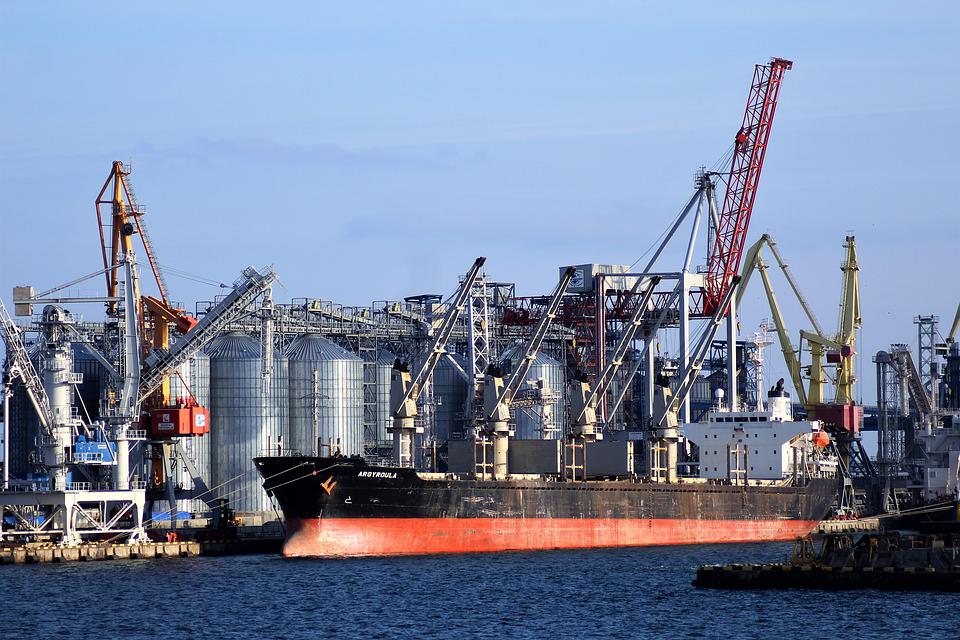This week, the first ship carrying Ukrainian grain left the port city of Odesa. This is the first ship to set sail to transport grain as part of the deal to unblock Ukraine’s ports in the Black Sea.
Ukraine’s infrastructure minister Oleksandr Kubrakov said Monday announced that the first ship carrying grain had left Odesa five months since Russia’s invasion.
This follows a deal between Russia, Ukraine, Turkey, and the United Nations to ensure the safe export of grain from Ukraine’s Black Sea ports, which were subject to a blockade from Russian forces during the war.
“The first grain ship since #RussianAggression has left port. Thanks to the support of all our partner countries & UN we were able to fully implement the agreement signed in Istanbul,” tweeted Kubrakov.
Kubrakov issued a separate statement explaining the impact of the unblocking of Black Sea ports to allow ships carrying grain to set sail.
“Unlocking the ports will provide at least $1 billion in foreign exchange revenue for the economy and an opportunity for the agricultural sector to plan next year’s sowing season,” said Kubrakov.
“In the ports of Greater Odesa, another 16 vessels are already waiting their turn. These are the vessels that have been blocked since the beginning of Russia’s full-scale invasion.”
Kubrakov added that this would bring Ukraine a step closer to preventing world hunger.
The crew on the ship, the Sierra Leone-flagged Razoni, carrying 27,000 tons of grain bound for Lebanon, were overjoyed to be able to leave. Despite being able to leave, crew members have expressed concern about possible mines. The ship will pass through the Bosphorous Strait by Tuesday.
Syrian junior engineer Abdullah Jendi said being able to set sail for the first time in five months was “the best feeling” this year. However, Jendi expressed fears regarding the naval mines and recalled how the alarms would go off in Odesa every day, with the crew fearing that they may never return.
Russia and Ukraine make nearly one-third of global wheat exports. Moscow has denied responsibility for the food crisis that emerged since it waged war on Kyiv back in February and instead blamed the crisis on Western sanctions for the slow exports.



 Jack Lang Resigns as Head of Arab World Institute Amid Epstein Controversy
Jack Lang Resigns as Head of Arab World Institute Amid Epstein Controversy  Pentagon Ends Military Education Programs With Harvard University
Pentagon Ends Military Education Programs With Harvard University  Ghislaine Maxwell to Invoke Fifth Amendment at House Oversight Committee Deposition
Ghislaine Maxwell to Invoke Fifth Amendment at House Oversight Committee Deposition  Trump Says “Very Good Talks” Underway on Russia-Ukraine War as Peace Efforts Continue
Trump Says “Very Good Talks” Underway on Russia-Ukraine War as Peace Efforts Continue  Trump Congratulates Japan’s First Female Prime Minister Sanae Takaichi After Historic Election Victory
Trump Congratulates Japan’s First Female Prime Minister Sanae Takaichi After Historic Election Victory  India–U.S. Interim Trade Pact Cuts Auto Tariffs but Leaves Tesla Out
India–U.S. Interim Trade Pact Cuts Auto Tariffs but Leaves Tesla Out  Bangladesh Election 2026: A Turning Point After Years of Political Suppression
Bangladesh Election 2026: A Turning Point After Years of Political Suppression  U.S. Lawmakers to Review Unredacted Jeffrey Epstein DOJ Files Starting Monday
U.S. Lawmakers to Review Unredacted Jeffrey Epstein DOJ Files Starting Monday  Trump Administration Appeals Court Order to Release Hudson Tunnel Project Funding
Trump Administration Appeals Court Order to Release Hudson Tunnel Project Funding  U.S.-India Trade Framework Signals Major Shift in Tariffs, Energy, and Supply Chains
U.S.-India Trade Framework Signals Major Shift in Tariffs, Energy, and Supply Chains  Anutin’s Bhumjaithai Party Wins Thai Election, Signals Shift Toward Political Stability
Anutin’s Bhumjaithai Party Wins Thai Election, Signals Shift Toward Political Stability  Ohio Man Indicted for Alleged Threat Against Vice President JD Vance, Faces Additional Federal Charges
Ohio Man Indicted for Alleged Threat Against Vice President JD Vance, Faces Additional Federal Charges  US Pushes Ukraine-Russia Peace Talks Before Summer Amid Escalating Attacks
US Pushes Ukraine-Russia Peace Talks Before Summer Amid Escalating Attacks  Bosnian Serb Presidential Rerun Confirms Victory for Dodik Ally Amid Allegations of Irregularities
Bosnian Serb Presidential Rerun Confirms Victory for Dodik Ally Amid Allegations of Irregularities  Antonio José Seguro Poised for Landslide Win in Portugal Presidential Runoff
Antonio José Seguro Poised for Landslide Win in Portugal Presidential Runoff  Trump Lifts 25% Tariff on Indian Goods in Strategic U.S.–India Trade and Energy Deal
Trump Lifts 25% Tariff on Indian Goods in Strategic U.S.–India Trade and Energy Deal  Sydney Braces for Pro-Palestine Protests During Israeli President Isaac Herzog’s Visit
Sydney Braces for Pro-Palestine Protests During Israeli President Isaac Herzog’s Visit 































